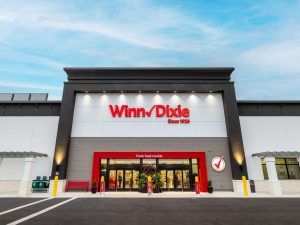ALDI to Acquire 400 Winn-Dixie and Harveys Supermarkets
The firm plans to own more than 2,400 stores by year-end.
Germany-based supermarket chain ALDI is continuing its expansion across the U.S. with the acquisition of approximately 400 Winn-Dixie and Harveys Supermarket grocery stores—mainly in the Southeast—from Southeastern Grocers. The deal is part of the Jacksonville, Fla.,-based company’s portfolio divesture.
Under the proposed merger agreement, ALDI will acquire all outstanding SEG capital stock in an all-cash transaction. Financial details were not disclosed but the definitive agreement has been approved by a majority of SEG stockholders and the merger is expected to close in the first half of 2024, subject to regulatory approvals and other customary closing conditions.
READ ALSO: Net Lease Cap Rates Rise for 5th Straight Quarter
SEG will continue to operate the stores under the Winn-Dixie and Harveys Supermarket banners until the transaction is completed. About 75 percent of the assets are in Florida, Alabama, Georgia, Louisiana and Mississippi, with almost 300 of the locations in the Sunshine State.
Following the purchase, ALDI will initially operate the assets under their existing banners while it evaluates which ones to be converted to the ALDI format. CEO Jason Hart said in prepared remarks the non-convertible shops will continue to function under their current brands.
RBC Capital Markets LLC, served as financial advisor to SEG. Willkie Farr & Gallagher LLP was transaction counsel and Kirkland & Ellis LLP served as antirust counsel to SEG. Deutsche Bank served as financial advisor to ALDI. Baker & McKenzie LLP was transaction counsel to ALDI and Kayne Law Group served as real estate counsel to ALDI.
ALDI’s expansion
The acquisition continues the growth of ALDI, one of the country’s fastest growing retailers, and supports the company’s long-term strategy to expand across the U.S. The firm had previously announced plans to add 120 new stores nationwide this year to reach a total of more than 2,400 stores by year-end.
ALDI first established its presence in the Southeast in the mid-1990s and has since invested $2.5 billion in the region. In February, ALDI opened its 26th regional headquarters and distribution center in Loxley, Ala., to help to support new stores and serve up to 100 stores in several southern states including Louisiana, Mississippi and Florida. The company plans to open 20 new locations in the area by the end of the year.
Hart told CNN the Southeast had been a big part of the company’s expansion plans even before the SEG deal was in the works. He noted the acquisition might also lead to leasing opportunities because ALDI stores typically require about half the square footage of traditional grocery stores.
More in store for SEG
In a separate transaction, SEG plans to sell its Fresco y Mas properties, comprised of 28 stores and four pharmacies, to Fresco Retail Group LLC, an investment group strategically focused on food and grocery. The firm expects that sale to be completed in the first quarter of 2024. The new ownership group plans to continue operating the properties under the Fresco y Mas banner.
CNN reported SEG has been having financial difficulties for years and shuttered about a third of the 900 Winn-Dixie stores in 2005 and laid off nearly 30 percent of the staff. According to CNBC, SEG filed for Chapter 11 bankruptcy in 2018 and closed almost 100 stores at that time. The company also backed out of two plans to go public in 2014 and 2021.
Another retail merger underway
Meanwhile, federal regulators are reviewing a merger plan between Kroger and Albertsons – two of the nation’s largest grocery chains. The $20 billion deal was announced in October and calls for Kroger to acquire all outstanding shares of Albertsons Cos. common and preferred stock and assume $4.7 billion of Albertsons’ net debt.
Kroger is dominant in the Midwest, while a fair number of locations for both companies are in the Southwest and Texas. Present in 48 states and the District of Columbia, Kroger and Albertsons have a total of 4,996 stores, 66 distribution centers and 52 manufacturing facilities.








You must be logged in to post a comment.